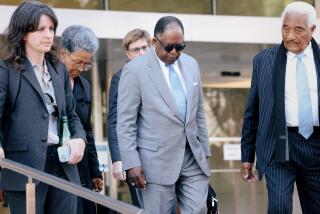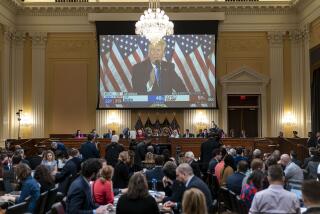Court Orders Hearing on New Trial for Keating
- Share via
Citing possible jury misconduct, a federal appeals court in Los Angeles on Friday ordered a hearing into whether a new fraud and racketeering trial should be held for convicted financier Charles H. Keating Jr.
The ruling by the U.S. 9th Circuit Court of Appeals comes just two months after Keating’s 1991 state securities fraud conviction was thrown out because it was based on “nonexistent and erroneous legal theory” and “erroneous” jury instructions.
The ruling raised defense hopes that Keating, 72, could be freed as early as this year from the 12 1/2-year sentence he is serving in a federal prison in Tucson.
“Keating is very pleased with the court’s order,” said his lawyer, Stephen C. Neal. “Coming on the heels of [the April] ruling, he’s obviously encouraged.”
Both cases stem from the 1989 collapse of Lincoln Savings & Loan in Irvine, which was the nation’s second-costliest thrift failure with $3.4 billion in losses.
An outspoken critic of regulators, Keating became the archetypal villain in the S&L; debacle of the 1980s, the symbol of greed and arrogance in the industry as he stood accused of looting Lincoln and swindling elderly investors.
Friday’s unanimous ruling by a three-judge panel requires a hearing because some jurors said they knew about Keating’s state court conviction and discussed it among themselves. Evidence of that conviction was excluded from the federal case, and a finding that it prejudiced jurors would result in a new trial.
In its order, the appellate court noted pointedly that post-trial affidavits by jurors warranted a hearing “unless the defendants’ guilt was overwhelming, which it was not.”
That language contradicts U.S. District Judge Mariana R. Pfaelzer, who presided over the federal trial and determined that evidence against the onetime real estate baron and his son was overwhelming.
In a telephone interview Thursday on an unrelated matter, Keating was upbeat about his chance of vindication, even though he criticized his continued incarceration after his state conviction had been dismissed.
“I’m in prison,” he said, “and 99% of the time you are out on bail until [the appeal] is decided.”
His son, Charles H. Keating III, who was convicted with him in January 1993, is free on bail pending his appeal. Friday’s order applies to the son as well.
Neal said he would seek his client’s release from prison, but prosecutors vowed to block it.
“The U.S. attorney’s office has been strongly committed to this case for many years and we remain unwavering and steadfast in our commitment to see that justice is done in this case,” said Steven E. Zipperstein, the chief assistant U.S. attorney.
Zipperstein said his office will do “whatever is necessary to uphold the convictions of both Keatings.”
Judge Pfaelzer had refused to allow evidence of the state conviction in the federal case because she believed the prejudice against Keating would be “altogether too great.” With the state conviction now thrown out, court observers said juror knowledge of it would indeed be too prejudicial.
Neal argued in the appellate court that sworn affidavits from five jurors and statements from two others prove that some knew about the state court conviction before the trial and others learned about it from fellow jurors after the federal trial began.
As a matter of law, he argued, “there must be a new trial.”
Prosecutors argued that Neal never asked jurors before the trial if they knew about prior criminal proceedings against Keating. In addition, Keating was not entitled to jurors who were ignorant about such general news as his conviction. And, they argued, the jurors’ awareness of the state case was “entirely harmless” and could not affect the verdict.
Neal said Friday that the appellate court’s order indicates that “there are major, major doubts about this conviction,” giving him further reason to seek Keating’s release pending a retrial.
Two of the jurors who provided affidavits to the defense after the trial told The Times on Friday that they were aware of the state conviction, but doubted that the outcome would have been different had they not known about the previous verdict.
“It had no bearing on whether I found him guilty,” said juror David A. Webb, who said he knew about the state conviction before he was selected for the federal case.
The Tujunga resident said he based his decision solely on “the facts presented before the jury and not on the stuff floating around in the ether.”
“That’s the way you’re supposed to do it,” he said. “The preponderance of evidence was there. He was guilty.”
Webb said it would be a “waste of taxpayers’ money” to retry the case. He called it unreasonable to expect to find jurors who are completely unaware of the news surrounding such a high-profile defendant.
Juror Thomas E. Sabetta of Glendale said that as far as he knew, no one discussed Keating’s state court case in the jury room but he figured that “there was nothing that wasn’t known prior to us going in.”
He said that before being called to jury duty, he had read news stories about Keating and was “familiar” with events involving the businessman.
He said he was never asked about his knowledge of Keating’s state conviction, and therefore never said anything about it until after the federal trial. That information, he said, did not affect his deliberations.
Keating, meanwhile, passes the time as the prison recreation supervisor.
“I exercise about 3 1/2 hours a day,” he told a Times reporter in an interview about the Olympic hopes of his grandson, swimmer Gary Hall Jr. “My blood pressure is down to where it was the day I left the [military].”
Times staff writers Greg Miller and Lisa Dillman contributed to this story.
More to Read
Inside the business of entertainment
The Wide Shot brings you news, analysis and insights on everything from streaming wars to production — and what it all means for the future.
You may occasionally receive promotional content from the Los Angeles Times.










